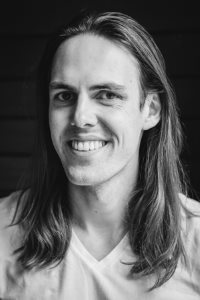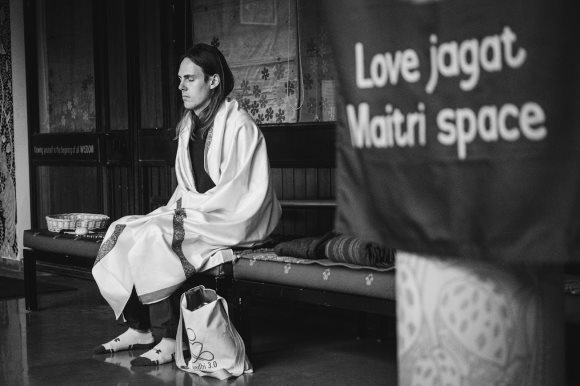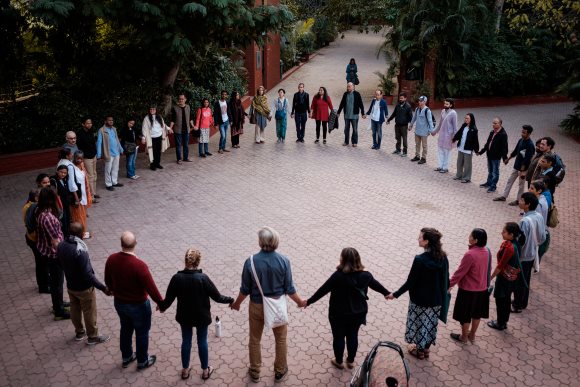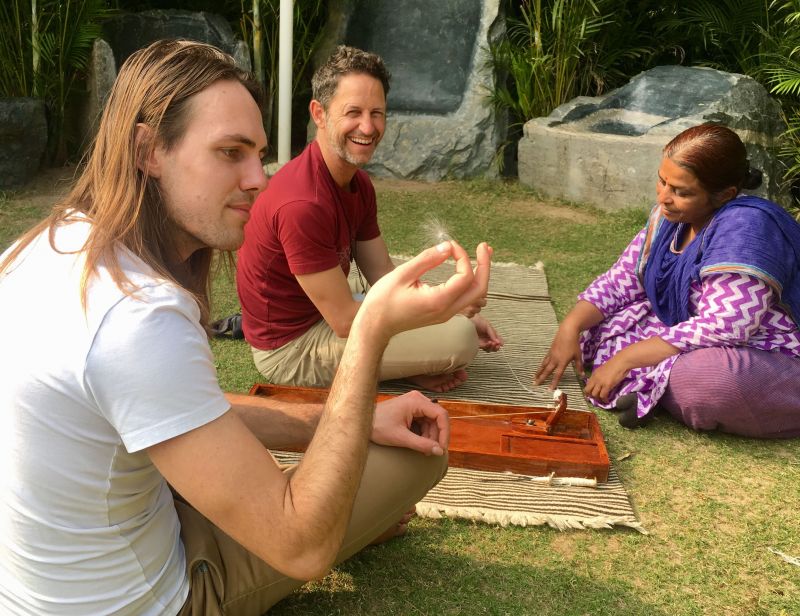Joe On North Dakota Radio!
[I love it when we find unexpected gems online. Below is a radio interview that Joe did, after returning from India. You can just listen to the audio clip, or read the transcript below.]
 This is Main Street, on Radio Republic. I'm Doug Hamilton. Thank you for joining us for our radio show all across North Dakota at this time of the day. Today, our show is starting with a very interesting topic in a person who's pretty well known in the state and certainly in the Fargo Morgan area -- Joe Burgum. He's recently back from India where he attended "Gandhi 3.0" retreat.
This is Main Street, on Radio Republic. I'm Doug Hamilton. Thank you for joining us for our radio show all across North Dakota at this time of the day. Today, our show is starting with a very interesting topic in a person who's pretty well known in the state and certainly in the Fargo Morgan area -- Joe Burgum. He's recently back from India where he attended "Gandhi 3.0" retreat.
Q: What is Gandhi 3.0?
Joe: Maybe we start at Gandhi 1.0, which is Mahatma Gandhi -- his work and his life as an individual who said that my life is my message.
Q: He was a famous nonviolent activist.
Joe: Absolutely. He really pioneered a lot of incredible things in the 20th century and arguably was one of the most important people of the 20th century. So Gandhi 1.0 was Gandhi -- one to many. And 2.0 was Gandhi's successor, Vinoba Bhave. He was one to one. He walked across villages of India and initiated the "land gift" movement. He would go to wealthy landowners and ask them to treat him as their son and to give away a sixth of their land away. Millions and millions of acres were given to those that were poor. That was Gandhi 2.0. And the idea behind 3.0 is many to many. It's this opportunity for each person to interact with many people, like how I'm here today speaking on the radio about love and compassion about Gandhi's life. During Gandhi's time, we couldn't tap into such many-to-many networks to influence and change the world.
Q: What is an ashram?
Joe: The word really means a community or community space. In this case, much of our time was at Gandhi's primary Ashram in the city of Ahmedabad. It was here that he spent 15 years of his life, really living the principles of nonviolence and doing the hard work of dispelling some of the hierarchical class systems that India had around the untouchability and gender, and what certain people would do or wouldn't do in a household. The Ashram really was a community of values. When Gandhi started the Salt March, there were 78 other people at the Ashram, and that movement is what really led to Indian independence. So this Ashram played an important role in history.
Q: Gandhi was born a little over 150 years ago. So his influence still reverberates. What did you know about him going into this?
Joe: Upon receiving the invitation, I went and started doing research and learning more about Gandhi. I watched the 1982 film, which is a fantastic movie. And after spending some time at the Gandhi museum and talking to some Gandhian scholars, I mean, his ideas are really quite relevant. It really is on point. I think for a lot of people my age, we sort of know Gandhi as an inspiration and "Oh, that guy with the quotes." [Laughs] So, it was really amazing to dig deeper. And I arrived home on Martin Luther King day, which I thought was incredibly fitting given the work that Gandhi did and the influence he had on Dr. King. Dr. King is quoted as saying, "God gave us the values and Gandhi gave us the tactics and they were both assassinated."
Q: What was the significance of being invited and what was the theme of this particular retreat?
Joe: You know, they talked a lot about synergies between unlikely groups of people. I mean, I was at a gathering with myself as an entrepreneur, as a community builder. There was a nun from the Philippines, farmers from Vietnam, monks from France as well as tech moguls and other entrepreneurs.
Q: So 78 people from all over were coming together?
Joe: Yeah, so it was really that sort of mixing pot or diversity of perspective coming together and really centered around compassion and love. I went into it thinking I was going to something where it was really going to be sort of a leadership development -- and I mean, Gandhi really is a leader. But it was much more of Gandhi as the man, and the values that he lived his life by. It wasn't about this show of an external impact. It was about truth, and living with compassion and the ripples and impact that can have on others.
Q: People were invited to this. This was an invitation-only event. Why you?
Joe: You know, I reflected on that going over there. And it was interesting 'cause I wasn't alone in terms of people getting there and saying, "Why me?" I feel really fortunate that I've had friends and mentors that have looked after me, and have really tried to create opportunities for me. One of those mentors had an opportunity to go to this gathering a number of years ago, and he suggested my name. So, I'd like to think that it comes back to community. There were a lot of people there that were doing really amazing things, but I was surprised that I was one of the few that was really talking about community. How do we support community? How do we build community? What are the needs of people in physical places and how do we add vibrancy and quality of life? I felt special in that I could bring that unique lens, from a rural community in America, with the challenges that we do have in our state.
Q: Joe Burgum is a community organizer in the Fargo Morehead area. He just recently returned from India where he was attending Gandhi 3.0 retreat at an Ashram. India is a very diverse country, has many, many, many religions, but it's predominantly Hindu. Is this like a Hindu experience?
Joe: Not at all. Um, you know, I think one of the things that Gandhi in his nonviolence and, and really if you look at sort of where he learned and the texts that he learned from, it was incredibly diverse. In terms of the background, Gandhi's life was deeply informed Christian or Muslim histories or other sacred texts. Even Tolstoy really informed his thinking. So the retreat was really refreshing, that instead of something that was trying to be really secular that often neuters religion from everything that we're doing (so we don't offend anyone), there really was an honoring of seven or eight major religions. We'd start every morning with a prayer from every religion, and when we had these community gatherings with the public, we'd have different individuals from our group share a prayer or message from each of those different religions. I thought that was a really refreshing perspective -- that by having none of the sacred traditions represented isn't necessarily the way that we add inclusivity; that perhaps it's how we acknowledge those that exist and find similarities, and practice love and caring for one another as brothers and sisters on the planet.
Q: How did you spend your time at this retreat?
Joe: It was a very light agenda. I think most people would see it and say, "What did you do all day?" Despite looking light on paper, the days were incredibly full -- and the time we spent together. One of the things that I've taken back that I thought was really interesting is that every time we gathered, we would take a moment of silence. Maybe not something we necessarily want on radio, :) but the power that silence has and really creating space amongst a group of people to be together to think about compassion, love, gratitude. That pause, within so much stimulus around us in the 21st century. We're so distracted, we're anxious. There's all this going on and the power to really pause and to slow down. Prayer brings that for many people. Church or a spiritual space or meditation or going to your yoga class -- it's a space for us to be able to slow down. And a big part of this gathering was bringing people together and allowing them to slow down.
Q: As I hear you describe this, it reminds me of a phrase that's been current for a few decades now. Servant leadership. Is that what this is about?
Joe: I think in a big way. I mean, you look at what Gandhi did in his life and a lot of it was about that. That's humility and servant leadership. One of the things that was really moving for me is that there were about 38 of us from around the world that came to this gathering and there was about an equal number of volunteers there that were hosting us. And these were people that were volunteers of ServiceSpace community, but also business owners. I mean individuals running large organizations that were taking time out of their schedule and being away from family over a holiday to host us. And really the, the, the humbling nature of that level of compassion is enormous.
On the, on the final day we did a meditation called three steps in a bow. You take three steps and then you kneel and bow and take three steps and bow. And for myself in that meditation, it was very blank. There wasn't much going through my head. Just really grateful to be there and walk through the gardens and got to the end of the line and the volunteers were there and we stepped into a bath and they washed our feet. And I stood up and I looked at all the volunteers and they knelt and bowed to me. And I just broke down in tears cause it was really ... you know, why me? To feel this level of service from individuals that I had never met before, was so moving and to have that space of the silence to see that and to be greeted with that love? It really inspired me back to come back to my work from Fill the Dome or student leadership or even the work we're doing with Folkways -- and see all that as an opportunity to serve. It really is a privilege to serve others and that to live is to serve and to serve is to love. That's something that we repeatedly came back to.

Q: Realizing that an experience like this can take upwards of the rest of your life to digest, what do you plan on doing with this experience? How will you incorporate it into the work that you do?
Joe: I've been thinking a lot, both at a personal and a professional level. In some ways, I feel fortunate that I have little bifurcation between what I do publicly and what do I do personally, particularly with things like the Farmer's Market that I've loved to be able to create. So, at a personal level, I've been thinking a lot about mindfulness and really how do we continue to have a discussion about mindfulness in our everyday life. I think it has to do with when we pick up our phone or when we're scrolling or even in our discourse -- how do we take a step back from ourselves and say, am I being curious? Am I learning? Am I being empathetic? Where is this energy coming from and where does it manifest in a bigger way?
At a professional level, it's something I've been thinking about for a while that really relates to this idea about how do we create a sense of belonging. As you know, within my work in our organization -- how do we really reach the edges of our community? How do shared experiences of love and compassion support our sense of belonging? How do we prevent loss of life, and how can such shared experiences prevent -- thankfully, we haven't had one -- mass violence in our state? When I've crossed someone's path, how can I slow down enough to have the awareness to say, "I need to spend another minute with you." That doesn't come easy. But we can all take that time to reach individuals who feel so isolated and so alone and so detached that they don't feel that their life is worthy anymore.
Q: Well, there's a stereotype about the people where we live. Germans from Russia or Scandinavians, they're stoic, you know, they don't share their feelings necessarily. Well talk a bit about that.
Joe: Yeah, it's not an easy thing. I laugh cause there's there's a lot of stereotypes and a lot of ways to go about it. We live in an age when there's more discussion about it than ever. Our secretary of Ag is talking about, "Hey farmers, if you're feeling isolated, reach out." I mean that is a profound thing that we live in an era where we have an elected official that's talking about mental wellbeing. Our hockey groups are getting together. I just saw this in the paper and talking about mental wellbeing. For me, in our work with Folkways, there's this sense that it is really through culture that a sense of belonging is developed. It may not be someone expressing their feelings, but it might be someone saying, "Hey, I really like coming to the farmer's market and finding the seat." I go to the cafe and I sit in this cafe and when I run into someone, it really makes my day. Those little moments -- we don't always know the impact we're going to have on someone.
One of the individuals that we were spending time in India was really amazing in just the way that he moved. His energy and the work that he did with the students in the slums was just beautiful in terms of the space that he came from. But he said that he doesn't necessarily want to know the impact that he's having. He just wants to be a conduit, and that outcomes and metrics can sometimes build the ego. We often hear stories or anecdotes of the little lady that lives across the street and you get up everyday and you smile and you pull out her trash. And that goes on for 15 years and you might not even know this individual. And when she dies, the kids say, "Hey, I just wanted to thank you. Reading through my mother's notes, she wrote about the impact that you had on her and brightening her day." Those are the beautiful moments that we don't know how we make someone feel even in this stoic society.
Q: The examples that you're giving are very much face to face human contact. And you mentioned at the very beginning, Gandhi, 2.0 was Gandhi the person interacting on a one-to-one level and then broadening that out now to Gandhi, 3.0 -- many to many. We now live in a very different society than when Gandhi was assassinated in 1947. Let's just throw out the word, the internet. How do they approach this blessing and a curse that is the internet?
Joe: Yeah, it's a big question cause we've gone through just absolutely exponential changes. I don't believe that in the last six years as a society, we've degraded to a level of sort of unbelievable bullying or meanness or that we've devolved as a society. Part of it is the platform and the platform lends itself to that level of discourse that when we're agitated and angry, we're impulsive and so we go and tweet. That tweet then gets retweeted by those that are also angry and agitated. And so there's an echo chambers. So I think there's something to be said about the platform that has lent itself to that. One of the things that ServiceSpace does is DailyGood -- an email they've been sending everyday for many years. It's just a simple email, a quotation, a bit of good news of the day that ends up in your inbox to really make you reflect.
Thinking back to my days in high school and how service and service leadership and student leadership was such an important part of that -- but we had a lot of work at the time at Oak Grove around bullying and it was early cyber bullying, early instant messaging, MSN, AIM messenger, and it was really peer-to-peer. There were adults that helped lead it, but it was students saying, "Hey, this is how I felt when someone said that about me online, anonymously." I think that's the level of accountability and empathy and compassion that we need to bring forth, which is "If my grandmother's going to see it on the front page of the paper, I'm probably not going to say it." Well, I'm probably not going to say it online if that's the mindset I bring to it. And that was something that we were taught as young people and students. But this disassociation that the platform brings, I think really allows us to be angry or mean or to say things that we would never say in line at the grocery store, or if someone cut us off. And maybe we are in the back of our head and maybe there's something to be said about that.
So how do we elevate today's platforms? How do we bring compassion to this platform? Or how do we say that maybe Facebook isn't the tool that we thought it was and maybe it's not going to be the thing that's going to carry us into the next decade. There is something to be said about showing up and going to the coffee shop and having a conversation or a debate in person with someone.
Q: Well, when you're at an ashram and there's this immersive spiritual experience that's going on, how about the practical objective of getting together like that? Was there a goal for this particular gathering?
Joe: You know, genuinely not. Often, you can go somewhere and I'm looking to deepen my practice in yoga or I'm looking to learn this or sign up for sort of a enrichment activity. This invitation was very broad, and really what I would call an emergent approach. That isn't necessarily always elevated in the West -- we're very metrics and goal oriented, looking at our performance indicators, to keep things ticking along. But this idea of an emergent approach says, "What happens when a group of us get together and just start a conversation?" What happens when we start getting together on a weekly basis and having a conversation based in values? What might emerge when that conversation or gathering isn't necessarily to create a project or to solve a problem? This gathering was about such ripples that came out of it.
Q: Well, were you changed in a way you didn't expect by doing this?
Joe: Yeah, I believe so. In a deep way. From a definition standpoint, one of the things that describes a spiritual experience is lack of words. Right away when I got back, people said, "Well, how was the experience?" It was really good -- like *really* good. But there's more to it. I've just had to take some time to sort of compile thoughts and stories and notes, but it was an incredibly meaningful experience to spend time in that way. To be that slow and mindful, to have time to breathe into the day and to share and learn from so many wonderful people.
Q: How will this change your yoga practice?
Joe: It has already, I would say. I think letting go and detachment is something that comes up. Not detachment in an apathetic sort of a way that we would define it, but I think realizing that we live outside of the actions that we take. The posture of the pose that we sit in doesn't define us necessarily but it's in the doing of it that something good happens. Not necessarily the outcome.
Q: Will you stay connected to these people that you experienced this with?
Joe: Yes, I hope to and intend to. Um, there's been a lot of good chatter online amongst the group and sort of a thread format and people sharing photos. And inspirations and reading. So it's been really great to have that sort of insight from all of these wonderful people and many of whom were much older. So I feel grateful to continue to be able to be mentored and learn from those that have much more life experience.
Q: Now, you have the opportunity to be a mentor.
Joe: I hope so. One of the quotations that was talked about a fair bit was this idea that it's not what we're doing but who we're becoming, which I thought was interesting. We, at least myself, often get caught up in what am I currently working on or what are the goals, that this is what's happening in the next quarter or the next 12 months. As someone that has a strength of vision personally, I often overestimate what I can get done in a year or what my team is working on and underestimate what we get done in three to five. As I look back on the last five years, with something like the Red River Market, our purpose was really about creating a space for community to come together. And I become emotional thinking about the joy that we've brought into this community and having a space like that on the weekends for people to celebrate with one another, share local music, eat local food, or just be, just come and sit in the sun. It's become a wonderful way to spend a Saturday -- and a life.

Posted by Parag Shah on Feb 17, 2020
SHARE YOUR REFLECTION
11 Past Reflections


On Feb 17, 2020 Rohit Rajgarhia wrote:
I loved the yoga metaphor you use "The posture of the pose that we sit in doesn't define us necessarily but it's in the doing of it that something good happens." :-)

On Feb 17, 2020 Preeta Bansal wrote:

On Feb 17, 2020 Audrey Lin wrote:


On Feb 18, 2020 Stephanie Nash wrote:

On Feb 19, 2020 Janessa Wilder wrote:

On Feb 21, 2020 Amir Imani wrote:

On Feb 21, 2020 Ariel Nessel wrote:

On Feb 21, 2024 cbd gummies wrote:

On Mar 1, 2024 Hildahaxia wrote:



On Feb 17, 2020 Hang Mai wrote:
Post Your Reply